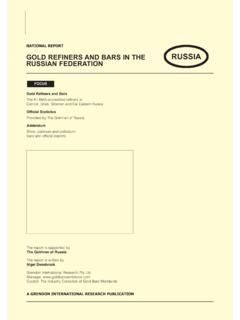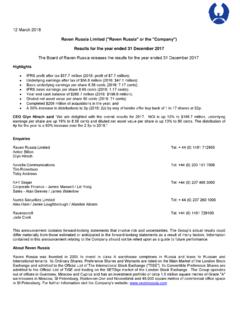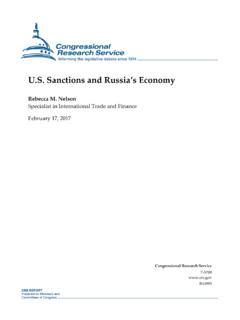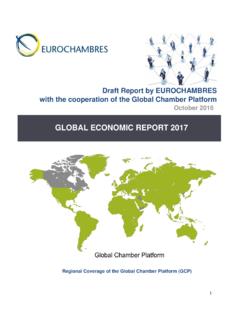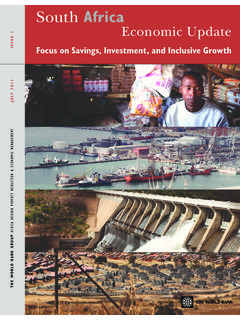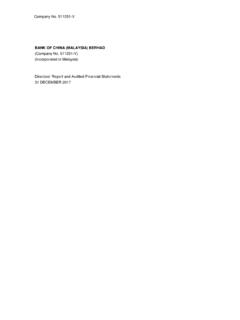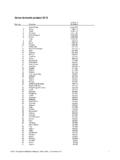Transcription of “Better Policies” Series RUSSIA - OECD.org
1 Paris2, rue Andr Pascal, 75775 Paris Cedex 16 Tel.: +33 1 45 24 82 00 better policies Series RUSSIAMODERNISING THE ECONOMYAPRIL 2013 iStockphoto/Aleksandar VrzalskiOECD better policies SeriesThe Organisation for economic Co-operation and Development (OECD) aims to promote better policies for better lives by providing a forum in which governments gather to share experiences and seek solutions to common problems. We work with our 34 members, key partners and over 100 countries to better understand what drives economic , social and environmental change in order to foster the well-being of people around the world. The OECD better policies Series provides an overview of the key challenges faced by individual countries and our main policy recommendations to address them. Drawing on the OECD s expertise in comparing country experiences and identifying best practices, the better policies Series tailor the OECD s policy advice to the specific and timely priorities of member and partner countries, focusing on how governments can make reform document and any map included herein are without prejudice to the status of or sovereignty over any territory, to the delimitation of international frontiers and boundaries and to the name of any territory, city or area.
2 **The statistical data for Israel are supplied by and under the responsibility of the relevant Israeli authorities. The use of such data by the OECD is without prejudice to the status of the Golan Heights, East Jerusalem and Israeli settlements in the West Bank under the terms of international are grateful to the Executive Director of the International Energy Agency, Maria Van Der Hoven, for the involvement of the Agency in this 2 Modernising the Russian Economy 3 Strengthening the Fiscal Framework 6 Strengthening the Financial Sector 8 Improving the Business Climate 10 Strengthening Competition 13 Improving the foreign investment climate 14 Reducing trade barriers 16 Reducing the size of the SOE sector and improving governance 18 Financing the Small and Medium-sized Enterprises Sector 20 Improving the Effectiveness of Public Administration 22 Fostering regional development 25 Strengthening innovation 27 Getting the right skills and competencies for a modern Russian economy 29 Striking a better balance between labour market flexibility and workers protection 31 Social policies to promote equity 33 Modernising the health care system 35 Promoting greener growth 37 Reforming the
3 Energy sector to modernise the economy 39 better policies for Agriculture 412 ForewordRussia has made fast progress in reducing poverty and catching up with the income level of advanced OECD countries over the past decade. However this progress has been largely supported by rising oil prices rather than the structural transformation of the economy. It has also been uneven. Regional and personal inequalities remain extremely large. Continuing the improvement in living standards requires simultaneously reducing dependence on natural resources, modernising the economy and fostering more inclusive and sustainable has many assets it can rely on to succeed in this challenge, including low debt, high labour force participation and abundant energy resources. Its leading position in areas like space technology suggests an untapped potential in other segments of the economy. To reap the fruit of this potential, renewed reform efforts are indispensable.
4 This is essential not only for RUSSIA but also for the world at on experiences in OECD countries and in our key partners, this report presents an OECD view of major policy challenges in RUSSIA , including the fiscal framework, financial sector, competition, business climate, governance of public enterprises, innovation, trade, social policies , employment, education, health, energy, agriculture and green policies . The OECD looks forward to deepening its relationship with RUSSIA and to working with RUSSIA , including through the OECD accession process, to contribute to making the RUSSIA economy modern, vibrant and inclusive. Angel Gurr a Secretary-General3 Modernising the Russian EconomyRussia still has a long way to go to reach the living standards of the most advanced market-oriented countries, despite clear improvements in the past decade (Figure 1). To narrow the gap, RUSSIA needs to modernise its economy, reduce its dependence on revenues from natural resource extraction and ensure more sustainable and broad-based growth.
5 By making it more attractive to live, study, work, innovate and invest in RUSSIA , the country can free the great potential of its people and ensure growth well beyond its natural resource endowment. Achieving this requires a combination of strengthened macroeconomic policy settings and decisive structural, social and institutional reforms. Figure 1: Percentage GDP per capita gap compared with the upper half of OECD countries- 100- 90- 80- 70- 60- 50- 40- 30- 20- 100- 100- 90- 80- 70- 60- 50- 40- 30- 20- 100 IndiaIndonesiaChinaSouth AfricaBrazilRUSSIAL ower half of OECD countriesOECD average%%20072011 Note: Compared to the unweighted average of the 17 OECD countries with highest GDP per capita in 2011 and 2007, based on 2011 and 2007 purchasing power parities (PPPs). The OECD average is based on a simple average of the 34 member : OECD National Accounts Statistics (Database); World Bank (2012), World Development Indicators (WDI) (Database); India National Sample Survey (various years), annual population estimates from the Registrar high potential with structural and institutional reforms The GDP per capita gap relative to the upper half of the OECD narrowed rapidly during the boom period of 2000-08 (Figure 2), but the impact of the global crisis was deeper and took longer to overcome than in other emerging economies.
6 Output growth has resumed, but the trend has fallen to below 4%, and remains excessively dependent on the revenues from natural resource extraction (Figure 3). Moreover, the economy is not fully exploiting the high skill level of the Russian 2. GDP per capita and labour productivityAs a percentage of upper half of OECD countries 2025303540455020253035404550199119931995 19971999200120032005200720092011%%GDP per capita GDP per hour worked1. Simple average of the top 17 OECD countries in terms of GDP per capita and GDP per hour worked (in constant 2005 PPPs).Source: OECD, Going for Growth 2013 (forthcoming).4 Figure 3 economic dependence on oil and gas extraction20406080100120-6-4-2024Q1 2003Q3Q1 2004Q3Q1 2005Q3Q1 2006Q3Q1 2007Q3Q1 2008Q3Q1 2009Q3Q1 2010Q3Q1 2011Q3Q1 2012Q3$ per barrelq/q % changeGDP at constant prices, seasonally adjusted (left scale)Crude oil Urals price (right scale)Source: Datastream and s relative strengths include very low public debt, high labour force participation, and a larger proportion of high-school students going on to tertiary education than in OECD countries.
7 In areas like space technology, RUSSIA is a leader. On the other hand, the economy exhibits low productivity levels, extreme inequality, poor health and environment outcomes, low access to and use of ICT, and mixed educational results. The business environment is undermined by weak rule of law and corruption. Russian leaders increasingly emphasise the importance of modernising and diversifying the economy and reducing budgetary dependence on oil and gas revenues. They have also recognised the importance of strengthening institutions. Ongoing initiatives aim notably at improving public administration efficiency, reducing corruption and stimulating innovation. Most of the gap in living standards is associated with a low level of productivity and therefore, structural and institutional reforms can contribute significantly. Productivity enhancements are all the more important given that rapid population ageing will weigh heavily on potential employment and thus on growth potential, even if there is significant room to increase the retirement scope for improvements in the macroeconomic policy framework is also wide, in particular to better insulate the economy from oil price fluctuations.
8 After the crisis, the budget has become increasingly vulnerable to a correction in oil prices, with the non-oil deficit expanding rapidly to above 10% of GDP. Gradual consolidation is needed, underpinned by a strengthening of the fiscal framework. This should include the consistent implementation of the new fiscal rule adopted at the end of 2012 which bases future budgets on the long-term average oil price (see chapter Strengthening the fiscal framework).Monetary policy has delivered a gradual decline in inflation over the past 12 years. However, switching to a low-inflation policy, featuring more exchange rate flexibility as a main external shock absorber and increased emphasis on central bank rates, is not without difficulties. It would also depend on further financial sector deepening that would strengthen the transmission of policy rates to real activity. Strengthening the rule of law, reducing corruption and broadening competition through less restrictive product market regulation will contribute to improve significantly the business environment and performance of the economy (see chapters Improving the business climate and Strengthening competition).
9 The governance of public enterprises must be improved and greater openness to foreign direct investment encouraged (see chapters Reducing the size of SOEs sector and improving its governance, Improving the foreign investment climate and Reducing trade barriers). Ensuring access to long-term financing is also key, in particular to support SMEs. The development of the private financial sector is therefore important (see chapters Strengthening the financial sector and Modernising the SME sector). Modernising the Russian economy also requires 5competent, accountable, open and dynamic public institutions with high levels of integrity (see chapter Strengthening the effectiveness of public administration). This also contributes to a more favourable climate for business R&D and the diffusion of innovation where performance is weak despite huge potential (see chapter Strengthening innovation).
10 The population does well in terms of the number of years of schooling, but educational performance ranks below most OECD countries in PISA and other tests, and there is a mismatch in the demand and supply of skills. There is therefore a need to invest in human capital, not only for the benefit of individuals and the labour market, but also to respond to the needs of a fast-growing and modernising economy (see chapter Getting the right skills and competencies for a modern Russian economy). Promoting more-inclusive and environmentally-friendly growth As in OECD countries and other large emerging economies, promoting higher growth in itself is not sufficient to really improve the well-being of the Russian population. The challenge is to promote inclusive growth that is also respectful of the environment. RUSSIA is characterised by high levels of both inter-personal and inter-regional inequality, which exceed those of most OECD countries and pose considerable challenges for social and regional policies (see chapters Fostering regional development and Social policies to promote equity).











